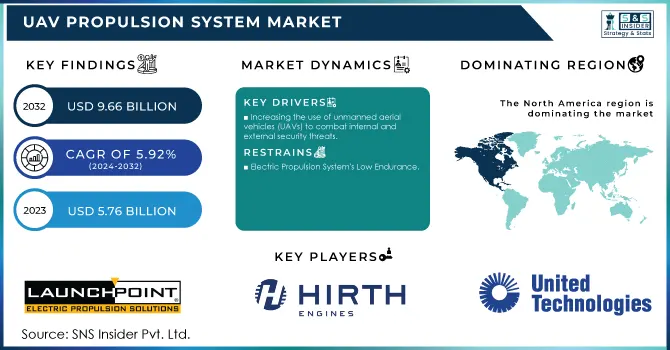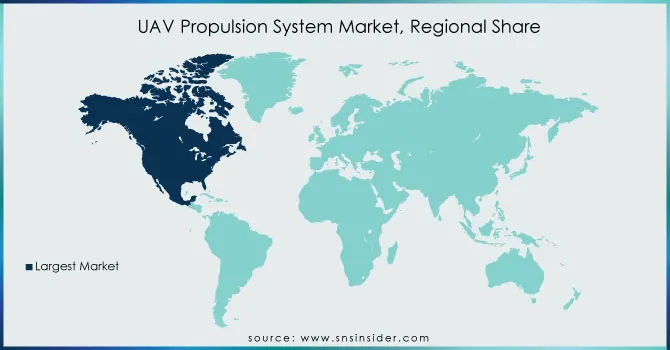UAV Propulsion System Market Report Scope & Overview:
The UAV Propulsion System Market was valued at USD 5.76 billion in 2023 and is projected to reach USD 9.66 billion by 2032, growing at a CAGR of 5.92% over the forecast period of 2024-2032.

To get more information on UAV Propulsion System Market - Request Free Sample Report
The capacity of unmanned aerial vehicles to fight effectively in urban locations against widely dispersed forces while reducing collateral damage and attaining information superiority has allowed them to play a larger role in important operations. The increased need for and reliance on unmanned aerial vehicles in war fighting and peacekeeping operations has more than doubled the rate of UAV-related R&D in recent years.
A UAV's endurance is impacted by the propulsion technology utilized, as well as the aerodynamic design and amount of fuel carried. Several kinds of piston engines and electric motors have been produced by market participants to meet the energy requirements of a wide range of UAVs. The potential benefits of a propulsion system are quantified in terms of their impact on the overall cost of the UAV. Lightweight, more fuel-efficient engines enable the use of costly payload for a particular mission without considerably altering the UAV's size and cost. Electric propulsion systems have grown in favour among small or mini UAVs in recent years due to their obvious benefits: silent operation, ease of handling and storage, precise power management and control.
MARKET DYNAMICS
KEY DRIVERS
-
Increased Interest in UAVs for Border Monitoring
-
Increasing the use of unmanned aerial vehicles (UAVs) to combat internal and external security threats
RESTRAINTS
-
Thermal Propulsion System Failure
-
Electric Propulsion System's Low Endurance
OPPORTUNITY
-
The demand for UAV propulsion systems is increasing all over the world.
-
Extensive research and development by various major key players in the global market creates a variety of growth chances during the anticipated period.
IMPACT OF COVID-19
The global COVID 19 pandemic has impacted a large portion of the population. As a result of the global pandemic, many people have lost their jobs. It has had an impact on the dynamics and growth of a number of sectors. Everyone is worried about their immunity and keeps a social distance. During the lockdown, numerous end-user industries' operational operations were interrupted, resulting in a fall in demand for the UAV propulsion system market, which results to lost sales income. Profit margins were also reduced as supply chain networks were disrupted.
However, by carefully planning according to market needs, the UAV propulsion system market is predicted to recover from this global pandemic by the end of the third quarter of the approaching year.
The market has been classified into three categories based on propulsion type: electric, thermal, and hybrid. The electric propulsion method is widely utilised in electric motors due to numerous advantages such as low maintenance, reduced noise generation, and low cost. A thermal system is utilised to improve endurance and increase military technology.
The market has been classified into three categories: long-range, medium-range, and short-range. Long-range will hold the greatest market share in the global market over the anticipated period due to increased application in armed forces.
The market has been segmented by end-user across the globe into military and defence activities, commercial activities, and consumer sectors. During the anticipated period, the military and defence sector will hold the highest market share in the global market due to increased utilisation in (ISR) intelligence, surveillance, and reconnaissance operations by armed forces.
The UAV propulsion market has a great potential for growth in the aerospace and military industries, which is primarily due to the rapid proliferation of UAVs. Aside from that, the rising use in commercial applications such as agriculture, photography, product transportation, and oil and gas has pushed the industry forward.
Value Chain Analysis
The global market for UAV propulsion systems is expanding at an unbelievable rate due to the numerous benefits associated with it. Because of the availability of high-tech monitoring equipment, it is mostly employed to control illegal migration. It aids in the monitoring of deforestation. It also keeps rebel organisations and drug traffickers at bay, resulting in a safe atmosphere. It aids in cost-cutting technology. This system is deployable and simple to operate. It also reduces health risks and hazards.
KEY MARKET SEGMENTATION
By Range
-
Long Range
-
Medium Range
-
Short Range
By Propulsion Type
-
Electric
-
Thermal
-
Hybrid
By End-User
-
Military & Defense
-
Commercial
-
Consumers
REGIONAL ANALYSIS
The market for UAV propulsion systems has been segmented by region, with North America, Asia-Pacific, Europe, Latin America, and the Middle East and Africa being the most important. The North American region has the greatest market share in the global market due to the presence of different major key players such as Orbital Corporation, GE Aviation, Ballard Power Systems Inc., and many others, as well as increased investment
The European area holds the second-largest market share in the global market, owing to the increased use of UAV systems for reconnaissance missions, surveillance, and intelligence systems, which drives market demand to this region.
The Asia-Pacific region holds the third-largest market share in the global market because to increased terrorist activities in countries like as Australia, Indonesia, China, and India, which results in more expenditure on the military sector and hence boosts market demand.
Because of the lack of infrastructure in both of these regions, Latin America and the Middle East and Africa have the smallest market share. Another barrier to market expansion in these areas is a low per capital disposable income.

Need any customization research on UAV Propulsion System Market - Enquiry Now
REGIONAL COVERAGE:
-
North America
-
USA
-
Canada
-
Mexico
-
-
Europe
-
Germany
-
UK
-
France
-
Italy
-
Spain
-
The Netherlands
-
Rest of Europe
-
-
Asia-Pacific
-
Japan
-
south Korea
-
China
-
India
-
Australia
-
Rest of Asia-Pacific
-
-
The Middle East & Africa
-
Israel
-
UAE
-
South Africa
-
Rest of Middle East & Africa
-
-
Latin America
-
Brazil
-
Argentina
-
Rest of Latin America
-
KEY PLAYERS
The Major Players are UAV Engine Ltd., Sky Power GmbH, Safran SA, LaunchPoint Technologies Inc., Hirth Engines GmbH, United Technologies Corporation, UAV Turbines, Inc., Rotron Power Ltd., Orbital Corporation, UAV Propulsion Tech and Other Players
| Report Attributes | Details |
|---|---|
| Market Size in 2023 | US$ 5.76 Billion |
| Market Size by 2032 | US$ 9.66 Billion |
| CAGR | CAGR of 5.92% From 2024 to 2032 |
| Base Year | 2023 |
| Forecast Period | 2024- 2032 |
| Historical Data | 2020-2022 |
| Report Scope & Coverage | Market Size, Segments Analysis, Competitive Landscape, Regional Analysis, DROC & SWOT Analysis, Forecast Outlook |
| Key Segments | • By End-User (Military & Defense, Commercial, Consumers) • By Propulsion Type (Electric, Thermal, Hybrid) • By Range (Long Range, Medium Range, Short Range) |
| Regional Analysis/Coverage | North America (USA, Canada, Mexico), Europe (Germany, UK, France, Italy, Spain, Netherlands, Rest of Europe), Asia-Pacific (Japan, South Korea, China, India, Australia, Rest of Asia-Pacific), The Middle East & Africa (Israel, UAE, South Africa, Rest of Middle East & Africa), Latin America (Brazil, Argentina, Rest of Latin America) |
| Company Profiles | UAV Engine Ltd., Sky Power GmbH, Safran SA, LaunchPoint Technologies Inc., Hirth Engines GmbH, United Technologies Corporation, UAV Turbines, Inc., Rotron Power Ltd., Orbital Corporation, UAV Propulsion Tech. |
| DRIVERS | • Increased Interest in UAVs for Border Monitoring • Increasing the use of unmanned aerial vehicles (UAVs) to combat internal and external security threats |
| RESTRAINTS | • Thermal Propulsion System Failure • Electric Propulsion System's Low Endurance |

